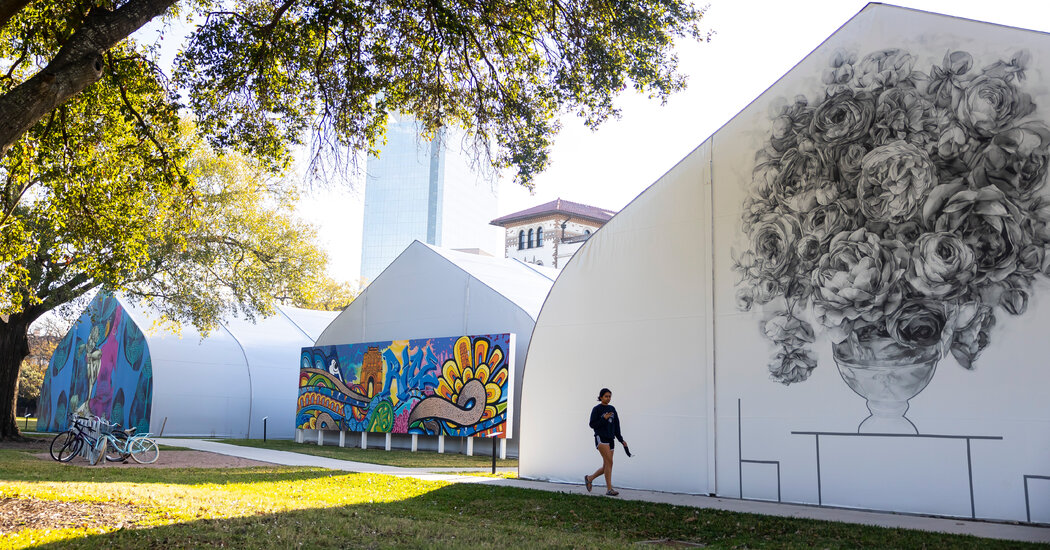
As the Omicron surge spreads across the country, sending Covid-19 case counts to new heights and disrupting daily life, some universities are preparing for a new phase of the pandemic — one that acknowledges that the virus is here to stay and requires a rethinking of how to handle life on campus.
Schools are asking: Should there still be mass testing? Does there need to be contact tracing? What about tracking the number of cases — and posting them on campus dashboards? And when there is a spike in cases, do classes need to go remote?
Universities from Northeastern in Boston to the University of California-Davis have begun to discuss Covid in “endemic” terms — a shift from reacting to each spike of cases as a crisis to the reality of living with it daily. And in some cases, there has been backlash.
“I think we’re in a period of transition, hopefully to an endemic phase,” Martha Pollack, president of Cornell University, said. “I say hopefully because with this pandemic, we don’t know what’s coming next.”
Most universities are still acting with caution. They are delaying the start of in-person classes and warning students that case counts could explode because of Omicron. They are encouraging, if not requiring, students to get booster shots. Many are handing out self-testing kits and KN95 masks. And for the most part, they are following basic protocols for quarantine and isolation, albeit for reduced periods of time, as recommended by the Centers for Disease Control and Prevention.
Yet some universities are also saying that spikes in cases do not have to be as disruptive as they were in the earlier waves of the pandemic. E. Gordon Gee, the president of West Virginia University, said at this point, it would be a strategic mistake to make short-term, reactive decisions, like closing down classrooms.
“I think there is a rush to do something immediate, and that kind of is a panic push, which I don’t like,” he said. “We’ll never go back to where we were, those days are done. This is what life is about. We have the Omicron, we have the Delta, next year when you and I take a flu shot, we’re going to take it with a dose of Covid vaccine.”
Some universities are even loosening what were once strict rules for quarantining and isolation. Harvard is instituting what it calls an “isolate-in-place policy,” meaning that students who test positive would, with some exceptions, stay in their dorm rooms, even with roommates. A school email suggests having “a conversation” about how to handle things if a roommate got sick.
“That’s messy, that’s really messy,” said Milagros Costabel Bionda, a first-year student. “We also have shared bathrooms.” Harvard declined to comment.
The University of Wyoming announced recently that its Covid approach was moving from “containment to management,” abandoning the mass testing it instituted last year. Last fall, the school tested 10,000 people over four days, according to Chad Baldwin, associate vice president for communications and marketing.
But this semester, he said, the university’s health advisory panel concluded that Omicron was so widespread that mass testing, by gathering people in one place, might actually do more harm than good. The public university, in Laramie, serves about 12,000 students.
“We feel like we have managed our way through this pretty well,” Mr. Baldwin said. And with Omicron, he added, “we’re facing a virus that appears to be less dangerous for most people — and we’re encouraged.”
Yet public health experts are cautioning that campus officials should not move too quickly.
“You’ll hear that people are tired of the restrictions and the regulations, and it is concerning to me,” said Gerri Smith Taylor, co-chair of the Covid-19 task force for the American College Health Association. “I don’t think we have all the data in on Omicron and Delta.”
Ms. Taylor said her organization is awaiting new guidance from the Centers for Disease Control and Prevention. An agency spokeswoman said recommendations were imminent.
At University of California, Davis, Chancellor Gary S. May faced a strong negative reaction after a Dec. 30 statement in which he characterized the Omicron variant as “milder” and suggested a shift to “living with Covid-19 at an endemic level.”
Classes were expected to resume in person on Jan. 10. But a petition signed by 7,500 people, referencing Dr. May’s use of the term “endemic,” accused the university of “not prioritizing the immuno-compromised, the disabled, unvaccinated people, children, those who live with people from any of these groups, or the general health of the public.”
Most in-person classes have been delayed until Jan. 31. “People were sharing their concerns, and the campus leaders listened,” said Julia Ann Easley, a spokeswoman for the university, who also noted a growing Covid-19 case count on campus.
Rice University, with 8,000 students, moved many classes to remote instruction this month and encouraged students to delay returning to campus until late January. And, like many schools, it recently required students and employees to get booster shots.
Yet its president, David W. Leebron, sees his campus, in Houston, soon entering what he called a “posture that recognizes Covid-19 as endemic.”
“What this means going forward is generally fewer restrictions that inhibit our activities,” Mr. Leebron wrote in a message to the Rice community. He envisions larger gatherings and less isolation.
Mr. Leebron noted in an interview that there has not been a serious Covid case within the campus community in months, and that he worries about the pandemic’s fallout.
“Across campus, there are mental health issues,” he said. “If we have a disease that, for college-age vaccinated people does not pose a serious risk, those other factors need to be taken into account.”
The Coronavirus Pandemic: Key Things to Know
Cornell University, in Ithaca, N.Y., is trying to shift focus away from case counts. The university has used a color-coded system — green, yellow, red — to flag the rate of infection. After an alarming spike in cases in December the university shut down part of the campus and moved final exams online.
For this semester, the university has kept the color-coding, but adapted the guidelines to recognize that almost everyone is vaccinated, including 99 percent of students and 100 percent of the faculty.
The goal now is not to shut down, she said, but to stay open as much as possible. That means, among other things, a short period of remote learning this winter and mask mandates indoors. Students will be asked not to socialize in large groups during the buffer period.
“A fully vaccinated population is a different beast, and we have to sort of learn to live differently,” Dr. Pollack said.
Risa L. Lieberwitz, president of the Cornell chapter of the American Association of University Professors, said that a shift in tactics was reasonable.
But she worried that faculty who had valid health reasons for teaching online would be hurt.
She pointed to a message to faculty saying that “full-time remote teaching is not an allowable substitute for in-person instruction.” This belied the notion that faculty members could ask for exceptions, she said. “I don’t think that’s an adequate response when we are in the middle of a pandemic.”
A few public colleges are rethinking counting cases.
The University of Florida discontinued its Covid dashboard at the end of the year, and transferred the data handling to the state, which it said in an email to faculty could provide a more “sustainable approach,” as the virus “becomes endemic.”
West Virginia University announced that it will no longer report testing, quarantine and isolation data for the spring 2022 semester. But it will continue to report vaccination rates for faculty, staff and students, which as of mid-December are much higher on campus than the rest of the state: 92 percent for faculty and staff and 82 percent for students.
“It’s not anything that we’re doing to hide, quite the contrary,” said Dr. Gee, the president. “We’re following the data that the C.D.C. and the public health department says matter the most.”
Youssef Georgy, a senior, said the atmosphere on campus is much more relaxed than it was a year ago, when professors lectured behind Plexiglas shields, virus testing was widespread, and sporting events and mass gatherings were canceled.
This year, besides classroom and common-area mask requirements, “everything’s pretty much free range,” he said. “Other than masks, you don’t really feel the presence of a pandemic.”




